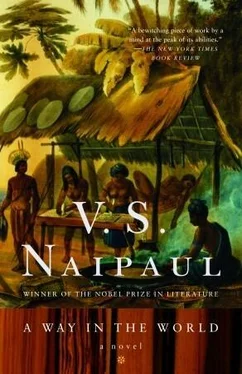Miranda was fifty-eight, white-haired. It might have seemed now that after all the years of waiting there was nothing left for him to do. But then, two years later, Venezuela declared its separation from Spain. The twenty-seven-year-old Simón Bolívar came to London to get help for his country, and Miranda went back to Venezuela with him.
He must have thought he was going back to a revolution that had been accomplished. He found a country split into all its racial and caste groups, a civil war beyond any one man’s managing, and far beyond his military skill. After twenty months the first phase of that war was over. The revolution had for the moment been defeated; in the jails revenge was being taken on republican prisoners; and Miranda — like a man who had run to meet the fate from which he had more than once escaped — was a prisoner himself, betrayed to the Spaniards, his old enemies, by the man who had called him out from London, and had gone to tea one day at Grafton Street.
He was kept for five months in the jail at La Guaira, from where the Prins Frederik had left in 1771. Then he was moved to the fortress of San Felipe in Puerto Cabello, where in 1806 ten of the officers of the Bacchus and the Bee, dressed in white gowns and caps, had been hanged and quartered and burnt with their uniforms and arms and Miranda’s own South American flag. Five months later he was taken to Puerto Rico, to Morro Castle, where thirteen men from the Bacchus and the Bee had for some time been imprisoned, loaded with twenty-five-pound chains, and given beds of stone and pillows of brick.
IT IS there now, while he is waiting to be transported to Spain, that Miranda is allowed visits by a Venezuelan, Andrés Level de Goda. Level is thirty-six, and a lawyer by profession. Thirty-eight years later, when most of these passions have turned to dust, and the reputation of Miranda has been all but erased, Level in his memoirs will provide the only witness (apart from official jail-book entries) of Miranda in captivity.
Level is of a creole landowning family, with (at least until the revolution) cocoa and sugar estates on the Venezuelan side of the Gulf. He is a royalist. He wants Venezuela to hold on to the Spanish connection. He thinks the revolution Miranda was called out to serve was started by local aristocrats — second-rate people, in his estimation — to settle personal grudges and to secure their own position, and had no popular support. A Venezuela set adrift from Spain will live through an unending civil war, Level thinks: the country is too full of factions and castes and hatreds.
Politically, Level and Miranda have been on opposing sides. But in Puerto Rico they are meeting in a kind of understanding. Miranda has been betrayed by the revolution and is now beyond politics. Level has been turned by the troubles in Venezuela and Spain into a wanderer with little money. He cannot for the time being go back to Venezuela: the revolution has caught alight again and he has been declared a proscribed person. In Puerto Rico he is dependent on the generosity of the captain-general, Meléndez, who is a friend. So both men, Miranda and Level, are also meeting in a kind of shared destitution.
On many afternoons Level goes to Morro Castle to sit with Miranda in his cell, and they talk while Miranda drinks his daily cup of tea. The head of Miranda’s special guard leaves the cell door open when the two men are together.
Level’s admiration for Miranda grows: the fluent speech, the authority, the voice, the physical presence of the old man, the knowledge of men and books and great events.
Meléndez, the captain-general, shows Miranda every regard. He has Miranda’s meals sent from a tavern outside. He even arranges for Miranda to get money (against funds in London) from an official on the British island of St. Martin, which is only a few hours’ sailing away.
Miranda is interested in the news from Spain, and Meléndez passes on the Cadiz newspapers as soon as he gets them. In them Miranda reads of the war against the French in Spain. He reads of the battles and growing reputation of the Duke of Wellington and General Picton, the former governor of Trinidad. The old man must suffer, thinking of his own fall, but he shows no emotion to Level or Meléndez.
He drinks his tea in a special way. He squeezes half a lemon into a cup of tea, and while he drinks this mixture he nibbles at the hull of the lemon, taking care (almost as if he is racing against himself) to finish both drink and lemon hull at the same time.
He says one afternoon to Level, “Why are you staring? You remind me of the Chinese in Trinidad. They thought I had come to take them home. Did Hislop tell you about that?”
Level knows the reference. He worked for some time in Trinidad as an adviser in Spanish law to Governor Hislop.
He says, “I’m not staring, General. I’m looking, to remember. I was thinking that one day I would be telling people that General Miranda turned his tea into a lemonade.”
“It’s what my father used to do on hot afternoons in Caracas. I began to do it when I came back.”
“When I’m with you I think of all the places you’ve been to, and all the people you’ve seen, and I can begin to feel that I myself have entered history a little. It is a feeling so precious I can hardly hold on to it. General, I’ve been trying for some time to put this to you. It is something I know I shouldn’t put to you. But, equally, I will not forgive myself later for not doing so. I want to know about Catherine the Great. If you think the question is wrong, please forgive me. If you think it is too intrusive, please consider it as never having been spoken.”
“It was one of the stories I encouraged, almost something I spread myself in the beginning, in my thirties, after I had left the Spanish service. Like so many of the thoughtless things I did then, it came back later and did me much harm. It exposed me to a lot of jealousy. Not in the way you might think. Venezuelans loved the story. They didn’t see it as a tribute to me. They saw it as a tribute to themselves. Some of them behaved as though I had taken away something from them. They felt that I had misused something that belonged to them. I had come between them and the arms of the empress. And then they extended this to my whole career. Whatever I had done in the world I had done, according to this way of thinking, only because I was like them, my critics. Whether in Russia or England or France or the United States, there was nothing personal about my achievement. If they had been where I had been they would have done what I had done. I had gambled nothing of myself, taken no risks, exercised no personal will. And this was extended even further. They had done it for me. I had done nothing. I was nothing.
“I told Hislop in Trinidad — I don’t know whether he told you — how Picton had damaged me in 1798, nearly thirty years after I had left home. He had written to the ministers in London that though I was important, I was nothing, the son of a Caracas shopkeeper. Of course he had got that from Caracas — and even at all the removes I could detect the voice of the Venezuelan who felt I had sullied the empress’s arms and spoilt what was his due.
“Something like that happened again when I came back. I had been called back by Bolívar, as you know, and I was going to stay in his house in Caracas, because after forty years I had none of my own. I didn’t go there directly. I thought I should behave formally and show respect to the revolution. When I landed at La Guaira I wrote to Roscio, the junta’s secretary for foreign affairs, asking for permission to go to Caracas. His reply was insulting and extraordinary. He said that I should never forget that I owed more than most to the country, because I had been unusually privileged and had spent many years abroad in the courts of Europe. What he was saying was that during my forty years abroad I had actually been exploiting the country, living off the national patrimony, and now should pay back a little of what I owed. And I knew at once that, though we were talking about the revolution, it was the old Catherine-the-Great jealousy at work on Roscio. That story did me much harm. I should never have come to Caracas after receiving that letter of Roscio’s. I should have known that the situation had been misrepresented to me. I should have stayed at La Guaira and gone back to Curaçao on H.M.S. Avon. I should have made them wait, for a year, if necessary. That’s how I should have handled it.”
Читать дальше












